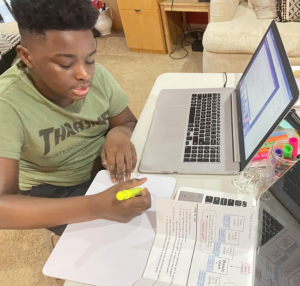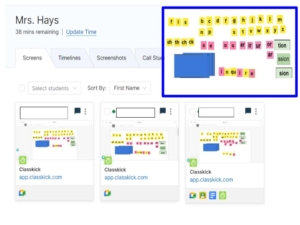Keeping Students Safe and Focused While Online
Keeping Students Safe and Focused While Online
 In December 2020, Chelsea School launched Go Guardian, a digital teaching environment for remote learning designed to filter and monitor content on all student devices, eliminate distractions through classroom management tools, and identify unsafe online behavior. The program also gives teachers, administrators, and parents direct access to student device activity.
In December 2020, Chelsea School launched Go Guardian, a digital teaching environment for remote learning designed to filter and monitor content on all student devices, eliminate distractions through classroom management tools, and identify unsafe online behavior. The program also gives teachers, administrators, and parents direct access to student device activity.
The impetus for purchasing this program was an understanding of the realities of virtual learning. Students are home all day working at their computers. They can become easily distracted by the number of entertainment options at their fingertips. They might also venture to places on the internet that are unsafe, or put themselves in unsafe situations by interacting with people who they do not know.
“About a week after the implementation of Go Guardian, the anxiety in the voices of all parents associated with monitoring their kids’ academic progress went away,” said Dean of Students Rueben Jackson. “They literally thanked us for purchasing software to support them as many parents cannot navigate the technology as fast as their children.”
Although safety was the driving force behind the roll-out, classroom management and teaching effectiveness became the true values in implementing the program.
“It saves me a lot of time and helps my class run more efficiently, so I spend more time on teaching reading and less on transitioning from different webpages. I can zap students to websites, monitor student work, and troubleshoot technical problems from one screen,” said Julia Hays, Chelsea School Reading Specialist.
Upper Division teacher Forrest Malone uses the program to support students with executive function tasks in his English class. “It gives me the ability to help students in real time. By seeing what they’re seeing, I can swiftly give the guidance they need to correct their own mistakes, and build the skills they need to succeed in the classroom.”
Speech language pathologists often provide support to students in their academic classes. In the virtual platform, it can sometimes be difficult to communicate with a student individually while in a virtual class. “As a related service provider working in the classroom, I appreciate being able to privately communicate with a student to check in or provide extra support while they are working on an assignment without other students knowing,” said Rebecca Rhine.
Managing over 100 students and staff all working from their homes on different devices each day is a challenging task for Chelsea School’s tech team. When technology problems occur, they need to be able to troubleshoot problems quickly.
“We can immediately determine whether or not a student is logged into their account properly so they can access important tools such as Google Read and Write,” said Karen Carlson. “We can see that they are navigating tabs to follow our instructions, privately message them and even open up tabs ourselves, which can save several minutes of time and immeasurable frustration because we bypass multi step processes for them.”
“Our goal in all of this is to protect our children while providing them with the best possible virtual education,” said Head of School Kristal Weems-Bradner. “This tool empowers teachers and gives them more control over their learning environment. It also frees our students from distractions and allows them to focus on their academic progress.”

